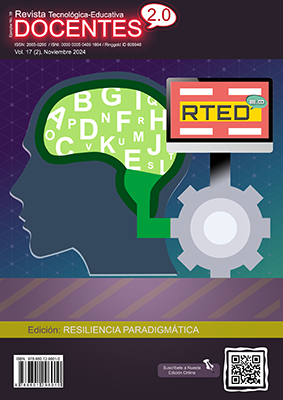Active Methodologies in the Legal Research Preparedness of the Human Sovereignty’s Connatural Law
 DOI:
https://doi.org/10.37843/rted.v17i2.477
DOI:
https://doi.org/10.37843/rted.v17i2.477
Main Article Content
Abstract
Human Rights as an international and internal norm also connote legality and legal order in the present reality, in the world, as well as in the space of the State. However, the natural, cultural, and legal categories are still delimited, and sovereignty is not being established. Human. Conceptualizing the knowledge and the scientific-legal method, it was possible to distinguish foundations and stages of the qualitative approach investigative process using basic principles with the application of active methodologies for the teaching of Unnatural Law as part of Legal Research with an epistemic process that makes logic, and They express the nature of laws within legal-scientific research. Managing to transform learning into an authentic and effective result of education, the essence was investigated with legal, scientific analysis in search of proving or refuting the hypothesis to propose a scientific truth or certain reality. By analyzing legal categories of International Law and internal or State rights with active methodologies, it was possible to know that they are in the evolutionary development of society constituting legal security - legal security of the right of sovereignty for the States, but not yet for the people, to whom it does not grant ownership and full exercise of their connatural rights in International Law. Currently, it is necessary to coherently establish the universalization of the free exercise of connatural sovereignty by international law, as well as state law, even considering that connatural sovereignty emanates from inalienable rights with which man was born who delegates its exercise and power that emanates from it, preserving it to coexist with its evaluative and axiological content.
Downloads
Metrics
Article Details

This work is licensed under a Creative Commons Attribution-NonCommercial-NoDerivatives 4.0 International License.
Those authors who have publications in our journal accept the following terms:
- When a work is accepted for publication, the author retains rights of reproduction, distribution of his/her article for exploitation in all countries of the world in the format provided by our magazine and any other magnetic medium, optical, and digital.
- Authors will retain their copyright and guarantee the journal the right first to publish their work, which will be simultaneously subject to the Creative Commons Acknowledgment License (Attribution-NonCommercial-NoDerivatives 4.0 International (CC BY-NC-ND 4.0)). That allows third parties to copy and redistribute the material in any medium or format, under the following conditions: Acknowledgment - You must properly acknowledge authorship, provide a link to the license, and indicate if any changes have been made. You may do so in any reasonable way, but not in a way that suggests you have the licensor's endorsement or receive it for your use. NonCommercial - You may not use the material for a commercial purpose. NoDerivatives - If you remix, transform, or build from the material, you cannot broadcast the modified material. There are no additional restrictions - You cannot apply legal terms or technological measures that legally restrict you from doing what the license allows.
- Authors may adopt other non-exclusive license agreements to distribute the published version of the work (e.g., deposit it in an institutional archive or publish it in a monographic volume) provided that the initial publication in this journal is indicated.
- Authors are allowed and recommended to disseminate their work through the Internet (e.g., in institutional telematic archives, repositories, libraries, or their website), producing exciting exchanges and increasing the published work's citations.
- Request of withdrawal an article has to be done in writing by the author to the Editor, becoming effective after a written response from the Editor. For this purpose, the author or authors will send correspondence via e-mail: [email protected].
- The author will not receive financial compensation for the publication of his work.
- All Docentes 2.0 Journal publications are under the Open Journal System (OJS) platform at: https://ojs.docentes20.com/.
References
Asunción, S. (2019). Metodologías Activas: Herramientas para el empoderamiento docente. Revista Docentes 2.0, 7(1), 65–80. https://doi.org/10.37843/rted.v7i1.27 DOI: https://doi.org/10.37843/rted.v7i1.27
Bobbio, N. (2002). Teoría General del Derecho (2da. ed. ed.). Temis.
Candado Trindade, A. A. (2014). La Humanizacion Del Derecho Internacional contemporáneo. México: Porrúa.
Izuzquiza, I. (2000). La sociedad sin hombres. ANTHROPOS.
Kelsen, H. (1982). Teoría Pura del Derecho (2da. Edición ed.). (R. J. Vernengo, Trad.) . UNAM.
Luksic, J. (2022). Encuentro Científico. CEPI - USFXCH.
Millán-Gómez, M. Ángel. (2023). Multiculturalismo Derechos Humanos y Políticas Públicas. Revista Docentes 2.0, 16(1), 83–94. https://doi.org/10.37843/rted.v16i1.360 DOI: https://doi.org/10.37843/rted.v16i1.360
Montesquieu. (1906). El espíritu de las Leyes. (S. G. Mazo, Trad.) Librería General de Victoriano Suarez.
Perez Lledo, J. (1999). Teorías críticas del Derecho. Editorial Trotta.
Rawls, J. (1996). Teoría de la justicia. Fondo de Cultura Económica.
Recaséns Siches, L. (2013). Tratado General de Filosofía del Derecho (21a. Ed. ed.). Porrua.
Salamanca Kacic, H. (2006). Derecho Internacional Público. Causa.
Salamanca Kacic, A. (2021). Estrategias Neurodidácticas de Enseñanza Aprendizaje para la Investigación Jurídica. Revista Docentes 2.0, 11(1), 11–18. https://doi.org/10.37843/rted.v11i1.142 DOI: https://doi.org/10.37843/rted.v11i1.142
Salamanca Kacic, A. (2022). Guía de Aplicación de Metodologías Activas en la Práctica Docente de la Educación Superior. Causa.
Tuori, K. (2000). Positivismo crítico y Derecho Moderno. Biblioteca de ética. Filosofía del Derecho y Política.
Virally, M. (1998). El devenir del derecho internacional: ensayos escritos al correr de los años. Fondo de Cultura Económica.
Young, I. (200). Justicia y la diferencia con la política. Princeton University Press.






